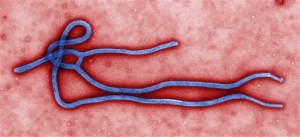Researchers find Ebola ‘Achilles heel’ — study

This undated file image made available by the Centers for Disease Control (CDC) shows the Ebola virus. AP FILE PHOTO
WASHINGTON, United States – US researchers believe they may have pinpointed the Achilles heel of the Ebola virus, which could hold the key to developing an effective preventative vaccine, a study reported Tuesday.
Research published in the latest issue of mBio, the online journal of the American Society for Microbiology, said scientists believed a protein called Niemann-Pick C1 (NPC1) was critical for Ebola to infect a host.
“Our study reveals NPC1 to be an Achilles heel for Ebola virus infection,” said co-study leader Kartik Chandran, associate professor of microbiology and immunology at the Albert Einstein College of Medicine at Yeshiva University.
READ: Sierra Leone official: Ebola worst could be over There are currently no federally approved treatments for Ebola in the United States, and all of the therapies in development elsewhere are designed to attack the virus.
Targeting NPC1 is the first host-based therapeutic approach to combat the disease, which claimed thousands of lives during a devastating outbreak in West Africa last year, the worst in history.
Previous in vitro studies had shown that Ebola enters host cells by binding directly to NPC1 and that blocking the virus’s ability to latch on to the protein prevented infection.
To see whether this process was repeated in living organisms, investigators exposed three different kinds of mice to the disease — normal mice, mice which had been genetically engineered to be completely deficient in NPC1 and mice engineered to have both a normal and a mutant NPC1 level.
While normal mice died from Ebola infection after nine days, mice deficient in NPC1 were completely free of the virus.
“Mice lacking both copies of the NPC1 gene, and therefore devoid of the NPC1 protein, were completely resistant to infection,” Chandran said.
“NPC1 is absolutely essential for in vivo pathogenesis, and if you can disrupt this, there are no signs of Ebola virus replication or pathogenesis,” added Andrew Herbert, senior research scientist in the Viral Immunology Branch at the US Army Medical Research Institute of Infectious Diseases in Maryland.
RELATED STORIES
British scientists trial 15-minute Ebola test in Guinea